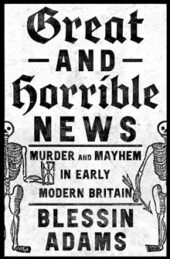The Elizabethan Mind is a book I’ve awaited with excitement. Some years back, I was fortunate to hear Helen Hackett present her work on what would become this book at a symposium held in honour of my supervisor and friend, Alison Thorne. To my delight, the text not only met but exceeded my expectations. Readers will welcome this refreshing account of an Elizabethan age seething with views on how the mind functioned, was organised, could be afflicted by illness, passions, and even race, or reordered and shaped according to devotional or educational practices.
The title might appear contentious, calling to mind Tillyard’s much-deconstructed Elizabethan World Picture. Was there just one monolithic “Elizabethan mind”? Indeed not. Hackett excels in showing the range of experiences, from philosophers and authors to women of varying ranks to Black Africans, which might be identified from contemporary writings as intellectually important.
The Elizabethan Mind is, in fact, Interested less in what Elizabethans thought than about how they thought about their thoughts: how they perceived the organisation of the mind; how they assimilated existing and produced new knowledge; how they considered the roles of mental illness (whether wrought from within or without), love, passion, and reason. How did our ancestors perceive the mind as expressed by behaviour, whether abnormal, affected, or verbal? How did they imagine each other’s minds? What did they read that informed their views, and what did they write expressing them? Hackett deftly tackles all of these questions.
The scope of the work is exceptional, ranging from plays (well- and lesser-known), letters, medieval reissues, and classical translations. Via this comprehensive approach, Hackett skilfully demonstrates that anxieties about and interest in the interior world – and its relationship with the material world – were not confined to lecture theatres; they were subjects of popular, lively debate: an early modern equivalent to the modern boom in self-help, pop-psychology, and counselling. Almost every page contains new and intriguing revelations and readings: witness the discussion of contemporary medicine’s recognition of “witty melancholy” – a perceived link between emotion and mental states and artistic and intellectual brilliance (which preempts the Romantic poets by centuries).
These anxieties found their expression and exploration on the stage, of course, and readers will be treated to sensitive readings of the plays (and thereby introduced to the developing popular culture of the day); but so too were they disagreed over by scholars and reflected upon in terms of poetry and life-writing. As Hackett shows, Elizabethans of all stripes were aware of – and unsure of – their sense of selfhood in the state and wider world.
The thesis of The Elizabethan Mind is that understanding how early modern – particularly late-Elizabethan – individuals conceptualised the mind can shed new light on the age’s literature. But this is not simply a work of literary criticism; Hackett goes beyond that and thus widens her potential readership. The book is academic in complexity and richness, but the writing style is sufficiently lively and engaging to ensure broad appeal. In fact, it ought to be required reading not just for students of literary and philosophical histories but for historical novelists and lovers of Tudor era culture, literature and thought. It is a triumphant, textually-informed history not only of the mind but of how it constructed and reconstructed race, gender, faith, madness, and emotion; in plumbing the Elizabethan mind, Hackett invites us all to think about the wonderful, ever-shifting idea of thought.
The Elizabethan Mind: Searching for the Self in an Age of Uncertainty by Helen Hackett is out now and published by Yale University Press.
Steven Veerapen is an academic and writer and author of Of Blood Descended, published by Polygon.







